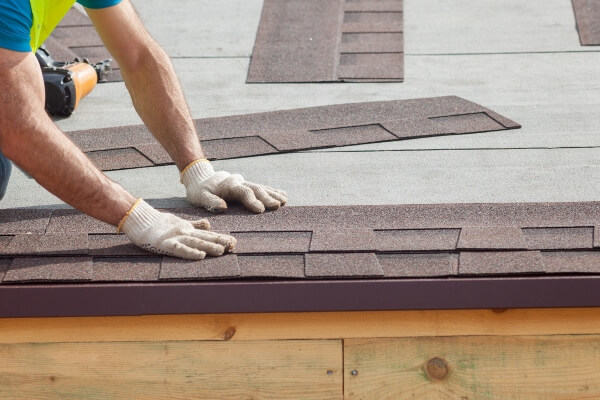What Licenses Do Roofing Pros Need In Texas?

If you’re a roofing pro, you are probably familiar with the risks associated with your work like physical injury or damage to other people’s property. As a professional contractor, it’s important to mitigate as many of these risks as possible for the safety of you, your employees, and your clients. One big step that you can take is obtaining a roofing license.
Navigating contractor licensure requirements can be tricky. Since roofers are regulated on a state level, it can be hard to figure out exactly what you need. Luckily, we’re here to help you learn what licenses you need as a roofing pro in Texas and where to get them.
Are you ready to get more roofing leads in your area? Sign up with CraftJack today.

Contractor Licenses in Texas
You may be surprised to learn that only 21 states require roofers to be licensed. Texas is one of the states that does not require licensure for roofing contractors. However, if you also participate in a listed specialty trade, such as HVAC or electrical, you will need a license to complete those types of projects. But on a state level, obtaining a license is voluntary for Texas roofers.
What’s unique about roofing in Texas is that rules and regulations vary by city. Places such as San Antonio and Austin do require that roofing contractors be licensed or registered within the city. Without it, you may not be able to get a permit for the job. Be sure to research the city and area you live in to see if they require registration or a city-issued license.

The Benefits of a License
So, if your city does not have any regulations regarding licenses, why bother? By acquiring a license, you are providing more value to yourself as a pro and to your customers. It provides you with more skills necessary to improve your business and additional education in your trade. After all, you will need to pass an exam to get your license, so it’s a good time to study and refresh.
Customers value a contractor who holds a license, which is something you can use to your advantage when marketing and building your clientele. A license adds a certain level of legitimacy to your business and eliminates customer fears that you may be trying to scam them. And in a state where a license isn’t required, holding one helps differentiate you from other pros. It shows that you want to be the best in the trade and have gone the extra mile for your business. Holding a license also reinforces trust that you understand safety regulations, have professional knowhow, and will do a good job.
It may require some extra work upfront, but having a license will help you win more jobs in your area and that is the best benefit of all!
How Do I Get Licensed in Texas?
For those who decide to get their roofing contractor license, the best place to start is with the Roofing Contractors Association of Texas. This trade organization is the most widely recognized in the state, meaning that having a license from them carries some weight. Their mission is to “represent the voice of the roofing and waterproofing industry in Texas.” Not only do they provide licenses for roofing pros, but they also educate and provide networking opportunities with other contractors.
According to the RCAT website, the process requires pros to meet certain qualifications, apply and submit materials such as credit references, business references and pass a safety exam. The license is good for one year and renewal requires continual education. There is a fee for the license and exam. For RCAT members, there is a $200 discount. Remember, you will be licensed as an individual and not as a business. If you are getting your license, it’s a good idea to have your employees get theirs as well.
Other Texas Requirements
The state of Texas does not require roofing pros to have general liability insurance; however, it’s always a good idea to have a policy. This not only protects you if an accident were to happen, but it covers homeowners as well. If you’re looking for further protection from claims, professional liability insurance is a great option for roofers. A roofing project is a big deal to a homeowner. If something goes wrong, it can cause a lot of damage and cost a good chunk of change. This type of insurance protects you and your employees from any claims of errors in your work. To learn more, see A Guide To Insurance For Contractors.
Even though insurance is not required by the state, the Roofing Contractors Association of Texas does require it in order to get a license. Residential contractor applicants must hold a $300,000 combined single limit general liability insurance policy or evidence that your firm can obtain a $100,000 surety bond. Similarly, commercial contractors must hold a $500,000 combined single limit general liability insurance policy or evidence that your firm can obtain a $100,000 surety bond. RCAT also requires contractors to have a worker’s compensation or other insurance plan providing equivalent benefits, with a few exceptions.
Additionally, some cities or counties in Texas require you to have a contractor license bond. This means that your projects have the financial backing of a bank or insurance company if at any point you were to break the signed contract between you and the customer. Check with your local regulations to see if there are any other bonding requirements for your area. Even if it’s not required, it doesn’t hurt to have one as a business owner.

Conclusion
Determining the exact license and registration regulations for the state of Texas can be tricky for roofing professionals. Even though you have some flexibility when it comes to being licensed, we strongly recommend obtaining a license, if possible. Customers value when pros go the extra mile to provide them with great service and are more likely to give you their loyal business.
You can ease customer fears by showing the proper qualifications. If you’re curious to see what customers might be worried about, read Homeowner Survey: See Their No.1 Fear.



